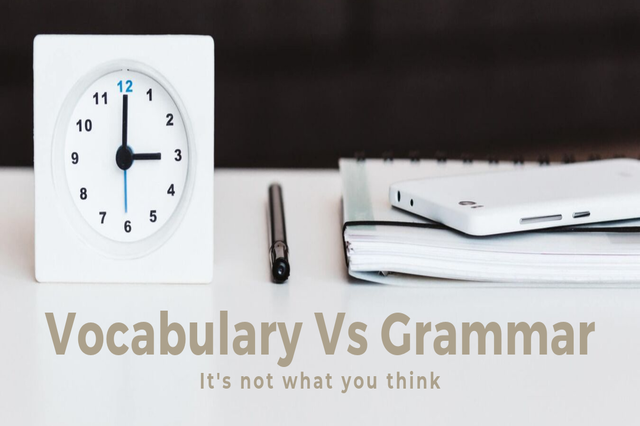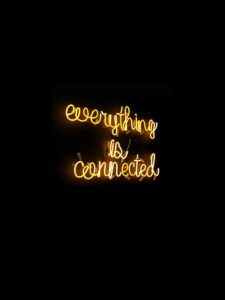
There are so many aspects to focus on when learning a new language. Just like the title says it's not about a showdown whatsoever. It's the opposite.
In this post, I will talk about grammar and vocabulary, what to choose when you just started, which one is more important, the difference, how to improve both, and so on.
Let’s start with the definition first shall we?
Vocabulary is a bunch of words you use to create a sentence. Grammar is the rules you apply to those sentences so they are structured correctly and become more understandable.
Without grammar, very little can be conveyed; without vocabulary nothing can be conveyed - David A. Wilkins
Honestly, it’s a battle between memorization (vocabulary) and comprehension (grammar). If I were to run a poll asking which is easier between these two what do you think will win?
Obviously, vocabulary for quite a few reasons. People will always opt in for an easier solution.
When it comes to learning foreign languages, we need to acquire as much vocabulary as possible to start making sentences and conversations. You only need grammar once you’re on a comfortable level. I will talk more about this towards the end.
Grammar and vocabulary go hand-in-hand. To truly know a word is to know both its definition and its grammar. And to truly know grammar is to understand how grammar rules look when they are applied to the use of words. – magoosh.com
It would be impossible to learn one without the other. When you decide to only learn the vocabulary you actually end up learning both without realizing it because you’re learning them in context.
For example, he ate fried chicken for lunch. You just learn a simple past tense there.

The same if you focus solely on grammar, you’ll still learn vocabulary. Why? Because in order to explain it words are needed.
If you’re a language student who is trying to become fluent, there’s a limit to how far grammar study can take you. Once you reach that limit, you’ll be held back by your lack of vocabulary. - clozemaster.com
Since there are already so many debates out there regarding this question I’m going to contribute to the percentage of those who say vocabulary is more important.
My reason is you don’t need to complicate the early process of learning a foreign language by learning grammar so soon. If you do that, I’m pretty sure you’re going to quit fast.
What’s the point of knowing the correct structure of a sentence when you know very few words to put the piece together? Of course, this can change depending on the situation you’re in.
If you’re a student, learning just one over the other isn’t an option. Learning a bit of both is the ideal way. How else are you going to write your essay, have your oral exam, etc when you don’t focus on both?
The same applies if you’re learning with a purpose such as business, job, etc.
If you’re a language enthusiast like me then it depends on what your end goal is. Mine is to be able to speak with native speakers even if it’s broken because I know I’ll improve along the way.
When I chat and/ or speak with Spanish native speakers who are learning English, and me learning their language we can still understand what each other says even if it’s not grammatically correct.
Why? Because we use the right words not the right way.
It’s important to speak from day 1 so obviously, you’re going to need vocabulary more than grammar. Put the latter away until you reach a certain level.
Traditionally, grammar is taught first; it has primacy over vocabulary. That’s why, in most traditional textbooks, grammar comes first and it is only later that reading and vocabulary are introduced. - Mohammed Rhalmi
I’m currently learning Arabic using a traditional method which is a textbook with no English translation. Thank God there are videos along with it because it’s an extensive course.
When it comes to the exercises the teacher told us ‘Don’t try to read and understand the instructions because you don’t know most of the words yet.’

The course focuses on both but more on grammar.
What’s unique about his method of teaching is he teaches us to analyze the structure without really going deep into the grammar in the beginning.
As we progress, our mind automatically knows how to create and pronounce the sentence correctly because of the analysis we made. It’s done repeatedly.
My point is depending on how effective the method of learning you choose can change your perspective. Because of this, I can say that grammar is more important than vocabulary.
We use the same words for different grammar until new words are introduced and it’s effective.
Now, my brain thinks vocabulary is less important and you can learn it later once you get a good grasp of grammar. When you know the structure it’s only a matter of replacing the words.
The con of this method is I’m not learning the right vocabulary. Yes, I might be good with grammar but I don’t think I can carry even a simple conversation with natives beyond the basics of how are you, what do you do for a living, etc.
When you come across words you don’t know while reading or listening look them up. I know most people do this but the mistake is they do nothing after figuring out the meaning.
I’d suggest you write them down only if you think you’ll be using or needing them somewhere in your life. Make sure to write in context because it’ll be more helpful than just a single word.
That way you don’t have to search how to correctly use it in a sentence again.
When you come across words you don’t know while reading or listening look them up. I know most people do this but the mistake is they do nothing after figuring out the meaning.
I’d suggest you write them down only if you think you’ll be using or needing them somewhere in your life. Make sure to write in context because it’ll be more helpful than just a single word.
That way you don’t have to search how to correctly use it in a sentence again.
When you come across words you don’t know while reading or listening look them up. I know most people do this but the mistake is they do nothing after figuring out the meaning.
I’d suggest you write them down only if you think you’ll be using or needing them somewhere in your life. Make sure to write in context because it’ll be more helpful than just a single word.
That way you don’t have to search how to correctly use it in a sentence again.
If you’re a blogger or a writer keep a dictionary handy and use it when you find yourself using a word too often or using a word that you know doesn’t quite convey the right meaning.
This will help you better express yourself, and also learn a new word in the process.

Use apps that are using the Spaced Repetition System (SRS) such as Duolingo, Memrise, ClozeMaster, etc. They will help with your memorization as they will test the words you’ve learned over and over again at different intervals.
The thing is most apps teach you words you probably need or don’t need in your daily lives. In this case, you can use Anki to save selected words and practice them.
Crossword puzzles are a challenge that get your brain working hard to search your memory for words you do know but don’t use, and this can help you move words from your memory banks into your working set of vocabulary which will come across in your writing. – wordcounter.net
Schedule time to learn both separately. Let’s say this week you want to learn about music-related vocabulary. Go to the internet and look for TV series, movies, reality shows, YouTube videos, websites, etc on that topic.
There are also some awesome Instagram accounts that focus on teaching simple phrases and grammar in a fun way. The key is to make your learning session enjoyable by doing things you already love so you don’t get bored. Don’t rush and take things slowly.
If you don’t like doing the heavy work, you can opt-in for online platforms such as Preply, iTalki, etc where you can find teachers who will customize the lessons based on your interests.
This saves you time from learning a bunch of useless vocabulary and phrases and focuses on relevant and important ones.
There is a reason we tend to travel with a dictionary, not a grammar book. – Worddive.com
The answer is vocabulary without a doubt. As I mentioned above words are needed to start a conversation and construct sentences. However, you can’t learn just vocabulary forever. At some point, you have to learn grammar.
For me, when I reach the B1 level that’s when I started to learn grammar. At this stage, I’d probably have acquired more than 1000 common words so I’ll slow down on the vocab area and focus on grammar.

Want to know a good thing about learning grammar?
You don’t have to learn all (that’s what happened to me). I took a test a few years ago to know where my English level is and the result is C1.
Frankly speaking, I was a bit surprised given that I still think my grammar is pretty much all over the place.
I mean there are some tenses I don’t know how to use, the preposition, etc. Despite all that, I’m able to hold long conversations with natives and do blogging (with a bit of help from Grammarly).
When learning vocabulary don’t forget about the pronunciation and intonation as well because you need these so natives can understand you clearly even though everything is pretty much broken.
To recap, before choosing between grammar and vocabulary you have to look at your goal and situation first.
If you decide the latter make sure to learn those you’ll need and use in your everyday lives. If it’s the former do take it slowly and make it entertaining to avoid burnout. Whatever you choose you still learn both eventually.
So, tell us which do you prioritize between grammar and vocabulary in the early stage and why? Write them in the comment below.
©2025 Together We Learn More
©2025 Together We Learn More
Paul Pacy says:
Great post, useful for all students 🙂
Meina says:
Thank you Paul =)
suchi says:
Yeah it’s great post
Meina says:
Thank you, Suchi